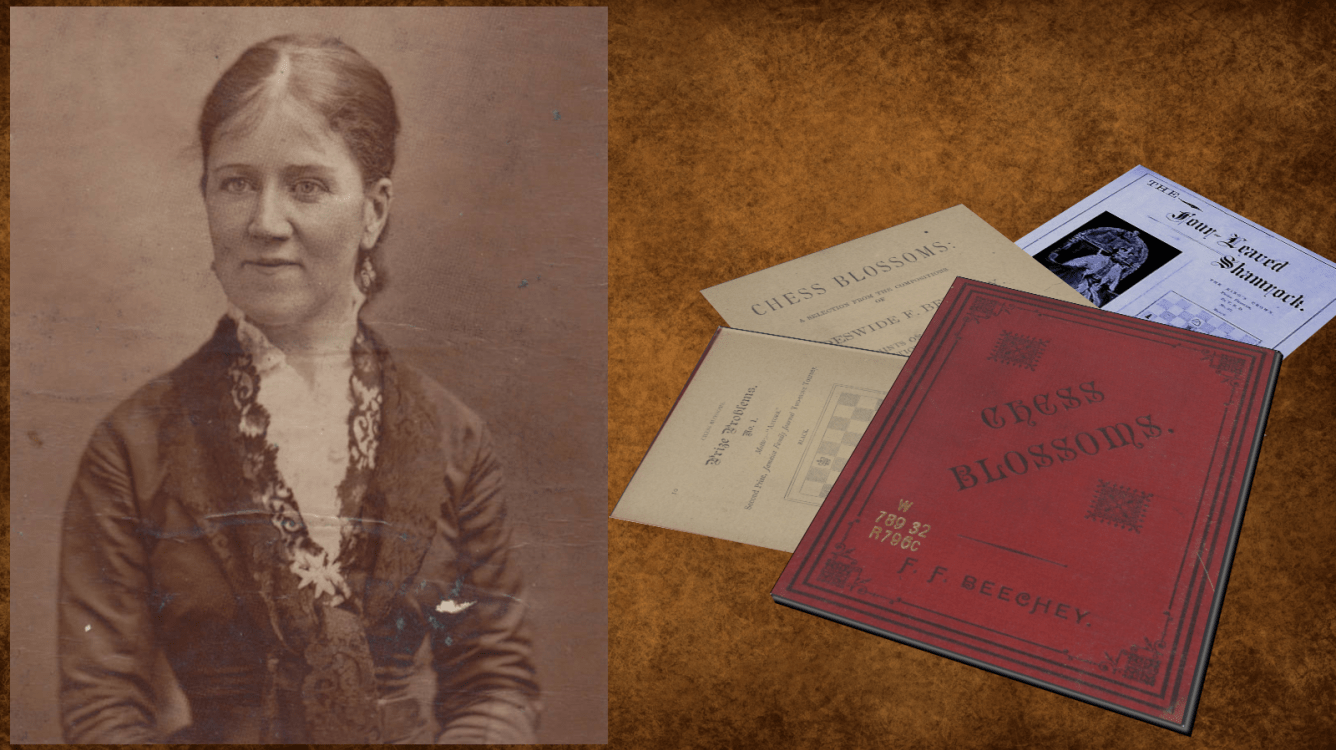
Frideswide Fanny Beechey - Rowland, an early chess Queen
It is well known that in the early years of modern chess, a woman's involvement, professionally or just seriously, was a rare thing. Beechey was one bright exception.
Frideswide Fanny Beechey (then Rowland) was born in Galway, Ireland, on 18.04.1845. Tim Harding notes [in History Studies v6 of ULIR (pp.48-63), p.50] that she "...began life with certain advantages. Her father Richard Brydges Beechey (1808-1895), and her mother was a member of the landed gentry in County Westmeath." On her thirties she started to be strongly interested in chess.

in Cleveland Public Library Digital Gallery
In 1881 she became the first woman to win in an international problem composing tourney, organized by the Jamaica Family Journal.
#1 problem Jamaica Family Journal prize
In 1883 she published her first book, Chess Blossoms [in Cleveland Public Library Digital Gallery], containing 46 problems of hers, where all but one were mate in 2. A notable subscriber was famous Zukertort!
Here're five of them. Some other problems after Chess Blossoms are following in this post with time sequence.
#2 problem mate in 2
#3 problem mate in 2
#4 problem mate in 2
#5 problem mate in 2
#6 problem mate in 3
In June 1884 she married Thomas Rowland [a chess composer, editor and honorable member of the Dublin Chess Club] in Clontarf, Dublin. Afterwards they published together 2 more chess problem books, Chess Fruits (1884) and The Problem Art (1887). She also edited Pollock Memories, 1899, [on Pollock check this older batgirl's article and this blog posting].
[edit 24/07/2018: two poems of hers #comments]

in F. R. Gittins' Chess Bouquet, 1897, pp. 77-79
They also created and ran a club in their home, Victoria Terrace, in Clontarf, and as Harding say "...was notable for its social inclusiveness".
#7 problem mate in 2, found in BCM 1886, p. 253 [maybe diagram can be seen only in downloadable pdf]. It was a prized problem within an Irish Chess Association tourney.
#8 problem mate in 2, in The international chess magazine, v2 (1886), p. 30
Frideswide, the chess column editor
Must be said that Beechey, since 1883 and for over thirty years, had been editor of many chess columns in newspapers and magazines, such as Matlock Register, Irish Sportsman, Nottingham Guardian, Bristol Mercury, Science Monthly Illustrated, Irish Weekly Mail, Cork Weekly News...
In 1905 she published her own chess paper, under the title The Four-Leaved Shamrock, as was an Irish paper with four pages. Last issue, n. 58 was published in July 1914. Harding [p. 61] mentions that "...the problem editor of BCM B. G. Laws, explained that Mrs Rowland had to cease the paper due to failing eyesight". [BCM 34(1914), p. 396]

photo found in this blog
But in American Chess Bulletin, v.13 (1916), p. 166 the editor inter alia writes about Shamrock suspension: "On the whole, it is not surprising, considering what Ireland has been through so recently and in view of the general conditions abroad." [for at the time Irish history check this] ... adding: "At the time of its cessation, The Four-Leaved Shamrock was holding a midsummer problem tourney in which the solvers were the judges." The winner for the record was R. G. Thomson of Aberdeen [problem at the appendix below].
Harding notes [History Studies, p. 61]: "Mrs Rowland cannot possibly have made any money with the FLS. However her will made in 1910, showed that she received income from a postal-nupitial settlement made by her father in 1885, amounting to £1209 2s 7d invested in three per cent Consols".
After Shamrock her Cork Weekly News column remained, that yet stopped in April 1916, according to Harding cause of health problems [p. 62].
#9 problem mate in 2, in The Chess journal, no. 112 (June 1888), p. 2
#10 problem mate in 2, The two-move chess problem by B. G. Laws, 1890, p. 109
Beechey, the chess player
In BCM 1884, p. 308 is represented the following game between Frideswide Rowland and James Alexander Porterfield Rynd, an Irish champion, and member of Dublin Chess Club, played at Leinster Lodge, Clontarf, Dublin "... with the large handsome set of Staunton pattern ivory Chess-men, presented to Mr. and Mrs. T. B. Rowland, by the Chessists of England, Ireland, and Scotland", followed by her husband's notes, maybe a little funny.
Harding again, in Blackburne's biography, p. 331, mentions that Blackburne, on his first visit in Ireland in 1894, had met the Rowlands. Specifically on 8th Feb 1894 "attended the “At Home” of the Glenageary Chess Club, held at the home of chess journalists Thomas and Frideswide Rowland, 4 Rus in Urbe, Kingstown (now Dún Laoghaire). He watched a match there between the Glenageary and City clubs (the latter being a temperance association), in which Mrs. Rowland beat Kenneth Arly Rynd, 29-year-old son of Porterfield Rynd.".
Probably Blackburne collected a good impression by the Rowland couple, as some years later in his Terms and themes of chess problems, 1907, p. 43 writes: "... are both very prominent figures in Irish chess, and both are good players and first rate composers, and have done much in the way of chess editing".
Frideswide also was a master in correspondence chess, participating and organizing.

Eliza Foot found in this blog
In Dublin Evening Mail, 14 Nov 1895 the following game was published, against an american player Eliza Campbell Foot [more on her here] within Ireland v America women’s correspondence match 1893-1895 [found in Harding's, Battle at long range, p. 597].
It's well known that Eliza Foot, President of the Women's Chess Association in New York, had played a postal match against Steinitz, game that she had won!! But Frideswide in FLS, 1911, n. 32-33, [found in Steinitz Papers, p. 159] reproducing a J. Lee's letter to her she adds: "During the seclusion at Upper Montclair, Steinitz was playing a correspondence game with his cousin, Miss Eliza Foot, President of the Women's Chess Association, New York. She sent me a copy of her game with Steinitz where in he resigned, but Dr. Pollock told me afterwards that Steinitz played the game without looking at the board." [game with some notes at the appendix below].
A funny incident is described in A. Luce's History of Dublin Chess Club, p. 14 [I must say that found only pdf's link and not the host site // in any case Harding also mentions it in History Studies, p. 54]. Specifically it's written: "The" At Home" in 1897 was an embarrassment, when Mr. F. F. Rowland wrote to ask why he and his wife had not been invited." Mr. F. F. Rowland??![]() Harding adds that "the complaint seems justified as she had given them advance publicity for the event in her column - in Weekly Irish Times, 13 Feb 1897"
Harding adds that "the complaint seems justified as she had given them advance publicity for the event in her column - in Weekly Irish Times, 13 Feb 1897"
In the same book is also represented a historic game of the above mentioned Rynd [check below in the appendix].

Rhoda Bowles in Cleveland Public Library Digital Gallery
Within Hobbies tourney, Ladies’ Division, 1900-1, [published with notes by Emanuel Lasker in Womanhood, April 1901 // found in Harding's Battle at long range] Frideswide had faced the well known Rhoda Bowles, with which she had a really good and regular contact. [Here're some of the many batgirl's posts on Rhoda Bowles (1) (2) (3) (4) (5)].
To the end
Frideswide Rowland "died at home on 25 Feb 1919, when the flu pandemic was at its height."[Harding, p. 62]. Obituaries were published in many papers. One can be found in American Chess Bulletin, v16, 1919, p. 156. A remarkable thing is that foreign press also published some. Here's one I've found in the dutch Het nieuws van den dag voor Nederlandsch-Indie of 6.07.1919, p. 9, where is published as well her Jamaica prize problem [the above #1]![]() .
.
#11 problem mate in 2, in Chess problems by James Rayner, 1890, p. 56
#12 problem mate in 2, in F. R. Gittins' Chess Bouquet, 1897, p. 78
I think that her preference was to compose more delightful problems than really hard...
Some main Reference
- Tim Harding, History Studies v6 of ULIR (pp.48-63)
- Tim Harding, Battle at long range in Trinity College Dublin site [especially pp. 278 & 474]
- Tim Harding, Blackburne biography [especially p. 331]
- The Steinitz Papers [especially p. 159]
- A. Luce's History of Dublin Chess Club [especially p. 14 & 47]
- F. R. Gittins' Chess Bouquet, 1897, pp. 77-79
- Frideswide And Reggie's Charming in The Streatham & Brixton Chess Blog
- Miss Frideswide Fanny Beechey in Yorkshire Chess History site
APPENDIX
#1 The R. G. Thomson of Aberdeen problem, winner of the last Four Leaved Shamrock tourney
#2 The Foot - Steinitz game
Here must be said that I've found 2 versions of this game, really similar. The first is in Harding's, Battle at long range, p. 596 where a question is expressed about some moves that maybe missing. The second is in chessgames where 4 plies are added. Here I represented Harding's version with his notes, so you can have both.
#3 The James Alexander Porterfield Rynd - George Frith Barry game. The earliest recorded game played at the Dublin Chess Club c.1870 between two founder-members, found in A. Luce's History of Dublin Chess Club, p. 47
Some problems and five games, I hope it was pleasant![]()
